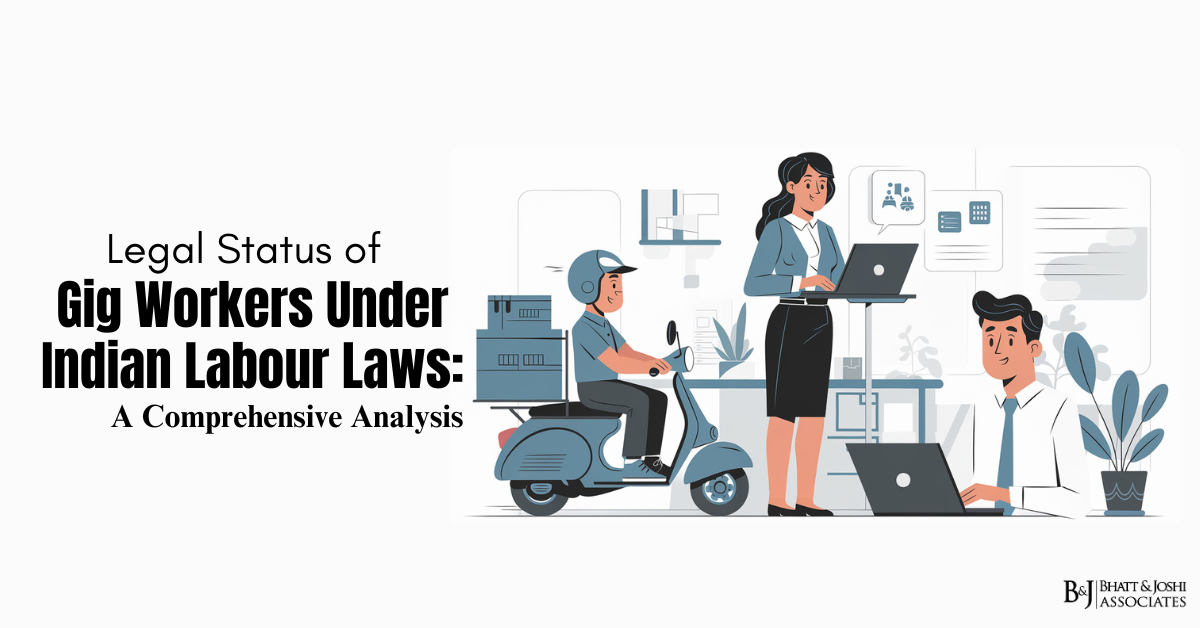Introduction
The gig economy, a dynamic and rapidly expanding sector, has fundamentally transformed the nature of work both globally and in India. Characterized by short-term contracts, freelance work, and flexible engagements, it encompasses sectors such as transportation, food delivery, and digital services. While this growth offers new opportunities, it has also exposed significant gaps in the legal framework governing gig workers, particularly concerning their classification, rights, and protections under Indian labor laws. This article provides an in-depth analysis of the legal status of gig workers under Indian labour laws, evaluates the adequacy of existing regulations, and discusses the pressing need for comprehensive measures to safeguard their rights
Understanding the Gig Economy and Gig Workers Under Indian Labour Laws
The gig economy encompasses a variety of work arrangements that diverge from traditional full-time employment. Gig workers in India, often engaged through digital platforms, perform tasks ranging from ride-sharing and food delivery to content creation and technical support. The term “gig worker” typically refers to individuals who undertake these jobs on a flexible basis, often without a formal employer-employee relationship. This lack of formal employment status has profound implications for their legal rights and access to benefits.
Classification of Gig Workers: Independent Contractors vs. Employees
A central issue in the gig economy is the classification of workers. Most gig workers are classified as independent contractors rather than employees, a distinction with significant legal implications. This classification affects their eligibility for various labor protections, including social security benefits, minimum wage guarantees, and protections against unfair dismissal.
Indian Labor Laws and Gig Workers
Indian labor laws have traditionally been designed to protect employees in formal employment settings. Key statutes, such as the Industrial Disputes Act, 1947, the Employees’ Provident Funds and Miscellaneous Provisions Act, 1952, and the Employees’ State Insurance Act, 1948, focus on defining and regulating the employer-employee relationship. This traditional framework often does not align with the nature of gig work, where the lines between employment and independent contracting are blurred. The recent labor reforms, encapsulated in the four labor codes—the Code on Wages, 2019; the Code on Social Security, 2020; the Occupational Safety, Health and Working Conditions Code, 2020; and the Industrial Relations Code, 2020—aim to consolidate and simplify labor laws. However, the extent to which these codes apply to gig workers remains limited, primarily due to their emphasis on traditional employment relationships.
Judicial Interpretations and Landmark Judgments
The Indian judiciary has played a crucial role in interpreting labor laws and addressing the status of gig workers. Notable judgments include:
- Piyush Pandey vs. Unacademy: This case highlighted the challenges of classifying gig workers. A gig worker at Unacademy claimed to be an employee and sought benefits under Indian labor laws. The court ruled in favor of Unacademy, maintaining that the gig worker was an independent contractor. The decision was based on the degree of control and supervision exercised by the platform, emphasizing the autonomy of the gig worker in setting work hours and choosing assignments.
- The Foodpanda Case (Delhi High Court, 2019): In this case, delivery personnel working for Foodpanda sought recognition as employees to claim labor law benefits. The Delhi High Court ruled that the delivery personnel were independent contractors, not employees, based on their flexible work arrangements and the lack of direct control by the company over their daily activities. This judgment underscored the challenges in applying traditional labor law concepts to gig work.
- Uber vs. Aslam (UK): Although not an Indian case, the UK Supreme Court’s decision in Uber vs. Aslam has had a significant impact on the global discourse regarding gig workers’ rights. The court ruled that Uber drivers were workers, not independent contractors, and therefore entitled to minimum wage and paid leave. The ruling highlighted the degree of control Uber exercised over its drivers, including dictating work conditions and setting prices. This case has influenced discussions in India, prompting calls for similar legal recognitions and protections for gig workers.
The Code on Social Security, 2020
The Code on Social Security, 2020, represents a significant step towards recognizing and addressing the issues faced by gig and platform workers in India. The Code introduces several provisions aimed at extending social security benefits to these workers. Key aspects include:
- Definitions: The Code defines “gig workers” as individuals engaged in work arrangements that fall outside the traditional employer-employee relationship, facilitated primarily through digital platforms. “Platform workers” are similarly defined, focusing on those who access work through online platforms.
- Social Security Benefits: The Code proposes the establishment of a social security fund for gig and platform workers. This fund is to be financed through contributions from aggregators, the government, and potentially the workers themselves. It aims to provide various benefits, including health insurance, maternity benefits, and pension schemes.
- Governance and Implementation: The Code outlines the establishment of a Social Security Board at the central and state levels, responsible for implementing and managing the schemes for gig and platform workers. The Board is intended to include representatives from gig workers, platform companies, and government officials, ensuring a balanced approach to governance.
While the Code on Social Security, 2020, is a positive development, its implementation poses several challenges. The voluntary nature of the contributions, potential gaps in coverage, and the absence of a clear enforcement mechanism raise concerns about the practical efficacy of the provisions. Additionally, the Code does not address crucial aspects such as minimum wage guarantees, working conditions, and job security, which are fundamental to ensuring comprehensive protection for gig workers.
The Need for Comprehensive Regulations
Given the limitations of the current legal framework, there is a pressing need for comprehensive regulations that extend beyond social security to include a broader range of protections for gig workers. Key areas that require attention include:
- Minimum Wage and Fair Compensation: One of the most pressing issues for gig workers is the lack of guaranteed minimum wage, leading to unpredictable earnings and financial insecurity. Establishing a legal minimum wage standard tailored to the gig economy could provide a necessary safety net and ensure fair compensation for work performed.
- Health and Safety Protections: Gig workers, particularly those in transportation and delivery sectors, face significant occupational hazards. There is a need for regulations mandating comprehensive health and safety standards, including insurance coverage for accidents and work-related injuries. These protections are crucial to ensuring the well-being of gig workers, who often lack access to traditional employee benefits.
- Collective Bargaining Rights: The right to organize and engage in collective bargaining is essential for gig workers to negotiate better terms and conditions. Legal recognition of gig workers’ associations or unions, along with protections against retaliation, is necessary to empower workers to advocate for their rights and address grievances collectively.
- Job Security and Anti-Discrimination Protections: Gig workers frequently lack job security and face the risk of arbitrary termination or deactivation by platforms. Regulations should establish clear guidelines for fair treatment, including protections against unfair dismissal and anti-discrimination measures. These protections are vital for ensuring that gig workers are not subjected to unjust practices based on race, gender, age, or other factors.
- Transparency and Accountability: Digital platforms should be transparent about their algorithms and decision-making processes, particularly concerning work assignments, ratings, and deactivations. Accountability mechanisms should be established to address grievances and disputes, ensuring that gig workers are treated fairly and equitably.
Comparative Analysis: International Perspectives
The regulation of the gig economy is a global challenge, with various countries adopting different approaches to address the rights and protections of gig workers under Indian labour laws. Notable international developments include:
- European Union: The EU is considering a directive aimed at improving the working conditions of gig workers, including reclassification tests to determine employment status and rights to collective bargaining. The directive seeks to address issues such as minimum wage, social security, and working conditions, offering a potential model for India to consider.
- United States: In the U.S., the debate over gig worker classification has been marked by legislative and legal battles, notably with California’s Assembly Bill 5 (AB5), which aimed to reclassify many gig workers as employees. While AB5 was later modified, it sparked a nationwide conversation about the rights of gig workers and the need for clear regulatory frameworks.
- Australia: Australia’s Fair Work Commission has been actively exploring ways to extend labor protections to gig workers, focusing on issues such as minimum wage guarantees and access to social security benefits. Recent legal decisions have recognized certain gig workers as employees, entitled to employment rights, highlighting the global trend towards rethinking traditional employment classifications.
These international examples underscore the need for context-specific solutions that consider local labor market dynamics, legal traditions, and social norms. They also highlight the importance of a balanced approach that protects workers’ rights while supporting the innovation and flexibility inherent in the gig economy.
Conclusion
The gig economy represents both a significant opportunity and a challenge, fundamentally reshaping the nature of work. In India, the legal status of gig workers under Indian labour laws remains a complex and evolving issue, with existing labor laws proving inadequate to address their unique circumstances. The Code on Social Security, 2020, is a notable step forward, but it addresses only a part of the broader challenge. There is an urgent need for comprehensive legal reforms that ensure gig workers receive fair compensation, adequate social security benefits, and protection from exploitation. These reforms should include clear definitions, enforceable rights, and robust mechanisms for grievance redressal. Policymakers, legal experts, and stakeholders must collaborate to create a regulatory framework that balances the needs of gig workers with the dynamic nature of the gig economy, ensuring that the future of work is fair, equitable, and inclusive for all.













